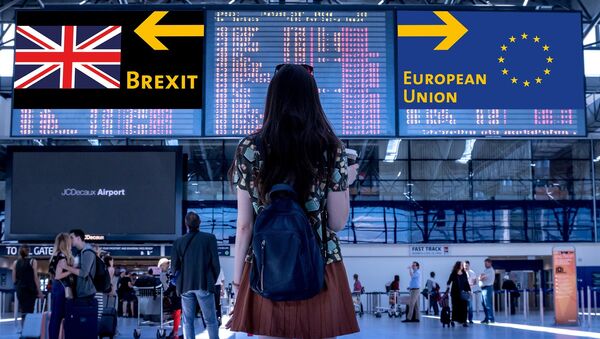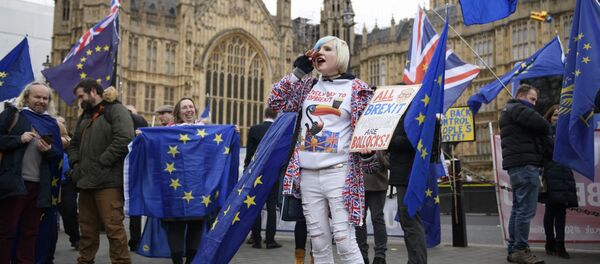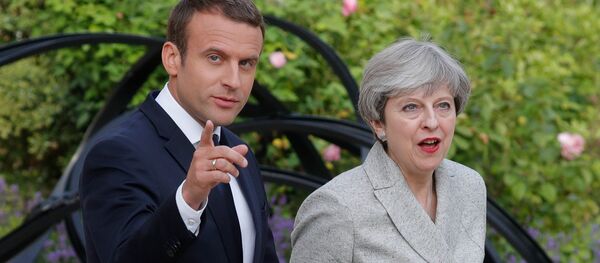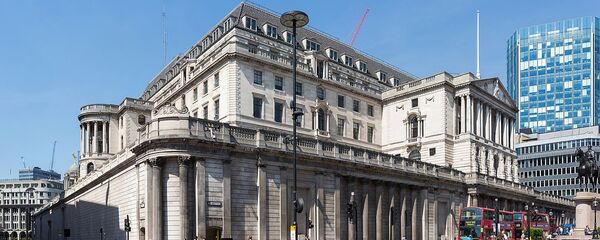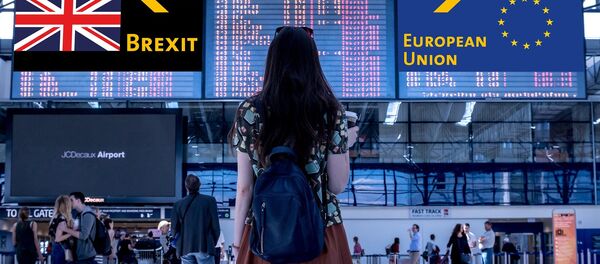The EC agreed unanimously to provide London with a brief extension of the Brexit deadline: if the House of Commons passes May's Brexit deal, the country will leave the bloc on May 22. If it rejects it, Brexit will still be delayed until April 12.
However, even if Parliament rejects the deal, there is another possibility, Becker said, one largely off the radars of those focused only on the political theater of the negotiations: "if grassroots pressure grows by leaps and bounds in the coming hours and days to redo a referendum — and there's more than a million signatures that have been put on a petition in the last few hours, a parliamentary petition calling for Article 50 to be revoked, meaning to cancel the leaving of the EU — that could change the game. But short of that, Theresa May is up against it now. She has to either get this resolution passed — and it's been defeated twice — or I think Britain leave the EU with no deal."
Becker noted that House Speaker John Bercow rejected the idea of May submitting the resolution for a House of Commons vote for a third time. "He invoked a parliamentary measure that's been used I think 12 other times since 1844 to say, ‘If you've already had a vote, unless there's a meaningful change in the resolution that had previously been defeated, it can't be brought back to the floor.'"
"Again though, I don't know if he'll do the same thing, because he's somebody who actually opposes Brexit. So, what Theresa May was trying to do, by having the third vote that he forbade, in essence, was to reign in more of the members of her own [Conservative] party and the DUP party from Northern Ireland to support her," Becker said. "Because she was basically saying to them, ‘Look, if you don't vote for me or my deal, we're going to end up either with no Brexit or we're going to end up with the Tory government sort of unable to continue as the government, and then there'll be a general election, and [Labour Party leader] Jeremy Corbyn might well be the new prime minister of the UK, so you decide now.'"
"So what she was basically doing was putting pressure on her own right wing," Becker told co-host John Kiriakou.
"There's a lot of pressure right now in all directions, but I think especially in the direction of a grassroots movement that's saying, ‘Leaving the EU was a mistake, we know it's a mistake now because of the way this has played out.' We have a new element in politics in the UK with this kind of grassroots movement that's emerging," Becker said. "The rumor I'm hearing here… is that there might be a grassroots mobilization of significant proportions against leaving the EU that might take place in the UK this weekend."
Show producer Walter Smolarek, sitting in for Becker in the studio, noted that rallies were expected on Saturday.
"A lot of people identify with Europe," Becker noted. "If you're a citizen of an EU country, you can travel anywhere in the EU. You can work anywhere. You don't have to wait at customs, border checkpoints. The free flow of people — not just capital — is a real thing, and a lot of people want to be able to travel and to relocate and to have that kind of interaction."
"There's other people, also, who are aware that Europe was at war in World War I, and 18 million people died. Europe was at war in World War II — 86 million people died. If you go back to the four centuries before those two wars, European colonial powers were fighting each other over who would control Africa, and Asia, and the Middle East, and Latin America and even North America," Becker told Loud and Clear. "So the idea of trying to end the scourge of war by European integration, that's attractive on a number of levels."
Becker noted he'd visited the apartment in Brussels where Karl Marx wrote "The Communist Manifesto" in 1848. "He was making the argument at that time, ‘workers of the world unite,' because what he was talking about was the workers in Europe were basically and constantly killing each other in endless wars. So, the idea of integrating Europe in a way that would sort of end this scourge of war… that's attractive."
"The problem is that the EU bureaucracy is dictated by the needs of the biggest banks — German banks and French banks and London-based banks. It's not really designed to be fostering unity between workers, but a kind of unity where everybody is in a race to the bottom in terms of lower wages and lower social benefits. That's the reason the EU has become a point of contention in London, in those industrial towns that have been hollowed out, or with the Yellow Vest movement in France or elsewhere."
"So there's a lot of contradictory elements here, but there's a general sense that it was the right wing that pushed Brexit, it was an anti-immigrant sentiment that was generated in the UK, that it was a scapegoating of people from Eastern Europe and Central Europe who were EU citizens and thus could move to the UK and basically take lower-wage jobs. It was basically doing what Donald Trump did in North America using immigrants as a punching bag."
"But now, we see the consequences of Britain leaving the EU in its kind of chaotic way. If it leaves with no deal, that means there'll be stiff tariffs, probably, or certain trade prohibitions that will, in fact, drain more jobs from the UK. So when people were voting for the referendum, voting to leave, they were promised, ‘Oh, we won't pay money to the EU bureaucracy; we'll use that instead for the National Health Service.' That sounds good. But in fact, that's not what's at issue here."
Becker noted that most figures in the British political establishment have dismissed the possibility of a second referendum, including Corbyn, who favors a "soft Brexit," or maintenance of a customs union relationship. He attributed this to dissidence within the Labour Party and recalled the so-called "Lexit," or "Left Brexit," by those in the UK who "wanted to get rid of the EU or be out of the EU because it's a big business association. But even they know there's an element of this which is based on a revanchist, right-wing, anti-immigrant populism, and absent a real, meaningful social justice program for workers in the UK, just leaving the EU won't necessarily improve anybody's living standards."
